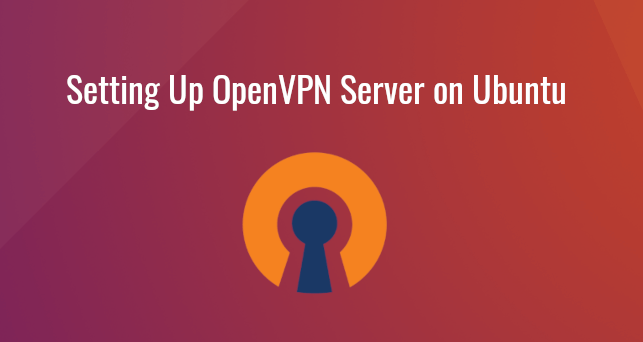In today's digital age, where online privacy and security are of paramount importance, setting up a Virtual Private Network (VPN) has become essential. Among the various VPN solutions available, OpenVPN stands out for its robustness and flexibility. If you're a Ubuntu user looking to enhance your online security, this comprehensive guide will walk you through the process of setting up OpenVPN on your Ubuntu system, ensuring a secure and encrypted connection for your online activities.

Understanding Ubuntu Compatibility
Before diving into the setup process, it's crucial to ensure that your Ubuntu system is compatible with OpenVPN. Fortunately, OpenVPN is highly compatible with Ubuntu, supporting a wide range of versions. Whether you're using Ubuntu 16.04 LTS or the latest release, you can rest assured that OpenVPN will seamlessly integrate with your system.
Preparing Your Ubuntu System
The first step in setting up OpenVPN is to ensure that your Ubuntu system is up to date. This involves updating your system's packages and repositories to the latest versions. Additionally, you'll need to install some necessary dependencies for OpenVPN to function properly. This can be done using the apt-get command in the terminal - "sudo apt-getupdate sudo apt-get install openvpn"
Installing OpenVPN Package
Once your system is prepared, you can proceed with installing the OpenVPN package. This package contains all the necessary files and configurations for setting up OpenVPN on your Ubuntu system. Using the apt-get command makes the installation process quick and straightforward, ensuring that you have OpenVPN up and running in no time.
Configuring OpenVPN
With OpenVPN installed, it's time to configure it to suit your needs. This involves customizing the configuration files to define your VPN settings, including the server you'll be connecting to, authentication details, and encryption settings. The configuration files are typically located in the /etc/openvpn directory and can be edited using a text editor such as Nano or Vim.
Setting Up VPN Gateway
One of the advantages of using OpenVPN is its ability to act as a VPN gateway, allowing other devices on your network to route their traffic through your Ubuntu system. This can be particularly useful if you want to secure your entire network or access geo-restricted content on devices that don't natively support VPN connections. Configuring OpenVPN to act as a gateway is relatively straightforward and can be done by modifying the server configuration file.
Securing Your OpenVPN Setup
Security is paramount when setting up a VPN, and OpenVPN offers several features to ensure the integrity and confidentiality of your data. This includes implementing robust encryption algorithms, enforcing authentication mechanisms, and configuring firewall rules to restrict access to your VPN server. By following security best practices, you can ensure that your OpenVPN setup remains secure against potential threats.
Testing Your OpenVPN Connection
Once you've configured your OpenVPN setup, it's essential to test your connection to ensure everything is working correctly. This involves verifying that you can connect to the VPN server and that your traffic is being routed through the VPN tunnel as expected. Testing your connection also allows you to identify any potential issues or misconfigurations that need to be addressed.
Installing VPN Applications
While OpenVPN is an excellent choice for setting up a VPN on Ubuntu, there are also other VPN applications available that cater to different preferences and requirements. Whether you're looking for a user-friendly interface, advanced features, or compatibility with specific protocols, there's a VPN application out there for you. Some popular options include NordVPN, ExpressVPN, and Surfshark, all of which offer dedicated applications for Ubuntu users.
Exploring Best Free VPN Options
If you're looking for a cost-effective solution to enhance your online security, free VPN options are worth considering. While free VPNs may not offer the same level of performance or features as their paid counterparts, they can still provide a basic level of protection for your online activities. Some of the best free VPN options for Ubuntu users include ProtonVPN, Windscribe, and TunnelBear, all of which offer generous free tiers with limited bandwidth and server access.
Downloading OpenVPN Application
To streamline the VPN setup process, you can download the Open VPN application for Ubuntu, known as OpenVPN Connect. This user-friendly application provides a graphical interface for configuring and managing your OpenVPN connections, making it easy for beginners to get started with VPNs. Additionally, OpenVPN Connect offers features such as automatic updates, network lock, and split tunneling, enhancing the overall user experience.
Configuring OpenVPN Application
Once you've downloaded and installed OpenVPN Connect, configuring it to connect to your VPN server is a breeze. Simply import the configuration files you created earlier, enter your authentication details, and you're ready to go. OpenVPN Connect will handle the rest, establishing a secure connection to your VPN server and encrypting your internet traffic to keep it safe from prying eyes.
Using OpenVPN for Secure Online Browsing
With your OpenVPN setup complete, you can now enjoy a secure and encrypted connection for all your vpn online activities. Whether you're browsing the web, streaming content, or accessing sensitive information, you can rest assured that your data is protected from eavesdroppers and hackers. OpenVPN provides peace of mind knowing that your online privacy is safeguarded, allowing you to browse the internet with confidence.
Best Practices for VPN App
While setting up a vpn app is relatively straightforward, there are some best practices you should follow to ensure optimal performance and security. This includes regularly updating your VPN application and configuration files, choosing strong encryption algorithms, and avoiding public Wi-Fi networks when possible. By following these best practices, you can maximize the effectiveness of your VPN setup and minimize the risk of security breaches.
Setting up OpenVPN on Ubuntu is a simple and effective way to enhance your online security and privacy. By following the steps outlined in this guide, you can create a robust VPN setup that protects your data from prying eyes and allows you to browse the internet with confidence. For further resources on VPNs and online security, be sure to check out the OpenVPN community forums, where you can find helpful tips, troubleshooting advice, and discussions with fellow users. With OpenVPN and Ubuntu, you can take control of your online privacy and enjoy a safer, more secure browsing experience.
How to Set Up OpenVPN on Ubuntu A Step-by-Step Guide
Setting up OpenVPN on Ubuntu is a straightforward process that can be accomplished with ease. Follow these steps to establish a secure VPN connection
Preparation Before you begin, ensure that your Ubuntu system is up to date. Use the following commands to update and upgrade your system-"sudo apt update sudo apt upgrade"
Installation Install the OpenVPN package using the apt package manager-"sudo apt install openvpn"
Configuration Create a configuration file for your VPN connection. This file typically includes information such as the VPN server address, authentication details, and encryption settings.
Connection Connect to your VPN server using the command-line interface- "sudo openvpn /path/to/config-file"
Best VPN Free Right Now Why Choose OpenVPN?
When it comes to selecting the best vpn free solution, OpenVPN shines for several reasons
Open-Source OpenVPN is open-source software, which means its source code is freely available for scrutiny and auditing by security experts.
Cross-Platform Compatibility OpenVPN is compatible with a wide range of operating systems, including Ubuntu, Windows, macOS, iOS, and Android, making it a versatile choice for users across different devices.
Strong Encryption OpenVPN employs robust encryption algorithms to ensure the confidentiality and integrity of your data, protecting it from interception or tampering by malicious actors.
Flexibility With OpenVPN, you have the flexibility to customize your best vpn configuration according to your specific needs, including the choice of encryption cipher, authentication method, and VPN protocol.
Easy Way to Install OpenVPN on Ubuntu
Installing OpenVPN on Ubuntu is a breeze thanks to the availability of pre-built packages in the official Ubuntu repositories. Simply use the apt package manager to install the OpenVPN package, and you're ready to go. Additionally, there are graphical user interfaces (GUIs) available for managing OpenVPN connect on Ubuntu, providing a user-friendly alternative to the command-line interface for less experienced users.
Configuration Setup OpenVPN on Ubuntu Tailoring Your VPN Experience
Configuring OpenVPN on Ubuntu allows you to customize various aspects of your VPN connection, including
Server Selection Choose from a wide range of VPN servers located around the world to optimize performance and bypass geo-restrictions.
Authentication Specify the authentication method used to verify your identity when connecting to the VPN server, such as username/password authentication or certificate-based authentication.
Encryption Select the encryption cipher and key exchange algorithm used to secure your VPN connection, balancing security and performance considerations.
Automatic Configuration Setup OpenVPN on Ubuntu
For users looking for a hassle-free VPN setup experience, automatic configuration options are available. Many VPN service providers offer dedicated applications or scripts that automate the setup process, allowing you to connect to their VPN servers with minimal manual intervention. These applications often include features such as automatic server selection, one-click connection, and built-in kill switches for added security.
Manual Configuration Setup OpenVPN on Ubuntu
For users who prefer more control over their VPN configuration, manual configuration options are also available. This involves creating and editing OpenVPN configuration files to define your VPN settings, including the server address, authentication details, and encryption parameters. While manual configuration requires a bit more technical expertise, it offers greater flexibility and customization options.
Why and When to Use OpenVPN on Ubuntu Understanding the Benefits
There are several compelling reasons to use OpenVPN on Ubuntu
Enhanced Security OpenVPN encrypts your internet traffic, protecting it from interception or eavesdropping by malicious entities such as hackers or government surveillance agencies.
Privacy Protection By routing your traffic through a VPN server, OpenVPN masks your IP address and hides your online activities from your Internet Service Provider (ISP) and other third parties.
Bypass Geo-Restrictions OpenVPN allows you to bypass geographical restrictions and access content that may be blocked in your region, such as streaming services, social media platforms, or websites.
Why Should You Use OpenVPN on Ubuntu Safeguarding Your Online Privacy
Using OpenVPN on Ubuntu offers numerous benefits, including
Secure Data Transmission OpenVPN encrypts your internet traffic using robust cryptographic algorithms, ensuring that your sensitive data remains confidential and secure.
Anonymity By masking your IP address and routing your traffic through a VPN server, OpenVPN helps protect your anonymity online, making it more difficult for third parties to track your online activities.
Freedom of Access With OpenVPN, you can bypass censorship and access restricted content from anywhere in the world, allowing you to enjoy unrestricted access to the internet.
How to Get OpenVPN on Ubuntu Accessing the Power of Secure Connectivity
Obtaining OpenVPN on Ubuntu is as simple as installing the OpenVPN package from the official Ubuntu repositories. Additionally, you can download OpenVPN configuration files from your VPN service provider's website to establish a connection to their VPN servers. With OpenVPN installed and configured, you can enjoy secure and private internet access on your Ubuntu system.
Advantages and Benefits of OpenVPN on Ubuntu Unlocking the Full Potential
The advantages of using OpenVPN on Ubuntu are manifold
Strong Security OpenVPN employs military-grade encryption to protect your data from interception or tampering, ensuring that your online activities remain private and secure.
Ease of Use With user-friendly GUIs and automated setup options, OpenVPN makes it easy for users of all skill levels to set up and manage their VPN connections on Ubuntu.
Versatility OpenVPN supports a wide range of VPN protocols and configurations, allowing you to tailor your VPN setup to meet your specific needs and preferences.
OpenVPN on Ubuntu offers a powerful and flexible solution for securing your online activities and preserving your privacy in an increasingly interconnected world. By following the steps outlined in this guide and harnessing the benefits of OpenVPN, you can enjoy a safer, more secure browsing experience on your Ubuntu system.











